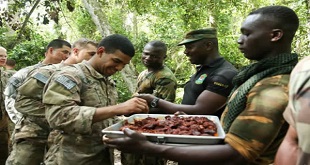Scores of soldiers from the United States of America have been schooled in jungle warfare by Ghanaian instructors at the Jungle Warfare School at the Achiase military base in Akim Oda.
A total of 63 soldiers comprised of US Forces aligned with US Army Africa spent last week at the Ghana Armed Forces training facility where they were trained by African instructors for the first time.
Brigadier General Kenneth Moore, USARAF deputy commander, said that having U.S. soldiers taught by African instructors was “kind of a ground-breaking event” that like much of what USARAF does, was intended to build partnerships and relationships with African militaries.
“And it contributes to Army readiness,” said Moore, after watching the soldiers in an improvised river crossing. “Exposing them to something they don’t normally train in is an Army priority in leadership training,” he said. “The soldiers’ morale is very high.”
Young said that the course, which taught jungle navigation, ambush offence and defence tactics, and survival tactics, was “eye-opening.”
The instructors, he said, “treat everything we do as if it’s life or death because when you are in the jungle environment, it really is. You constantly have to be very vigilant… otherwise, the jungle environment will eat you up.”
The school was a highlight of USARAF’s annual Central Accord series of training African troops for peacekeeping missions throughout the continent. It followed on last year’s exercise that sent two platoons of soldiers from the 3rd Infantry Division through a French-run jungle warfare course in Gabon.
Interestingly, one of the 63 soldiers, Spc. Bryan Young, with the 1st Battalion, 506th Infantry Regiment, 101st Airborne Division who took the course, said in a videotaped interview that they ate a python which was “extremely spicy” during the excercise.
U.S. troops have not engaged in sustained jungle warfare since Vietnam. Jungle training was nearly phased out after the conflict, but it now seems to be on an upswing. The Army’s 25th Infantry Division in Hawaii set up a jungle school in 2013 as its footprint was shrinking in Iraq and Afghanistan. And in 2014, U.S. Marines, whose 3rd Marine Division has a Jungle Warfare Training Center in Okinawa, Japan, made news as they learned how to catch cobras, drink their blood and behead chickens with their teeth as part of a jungle warfare exercise in Thailand.
Second Lt. Hugh Smith said in his interview that the humidity and heat in the tropical Ghanian jungle — over 100 degrees Fahrenheit — was a major challenge on its own. “You hear the stories of the guys in Vietnam and the Pacific during World War II who were fighting in jungles … and how miserable and terrible it is, but it’s hard to really understand exactly how miserable and terrible it was until you get out here in the jungle.”
“I don’t think anyone will forget this experience, to be honest with you,” said Sgt. 1st Class Eric Kramer. “It’s too real, just the threat, the spiders, insects, getting lost in the jungle, hydrating.”
Smith said he was glad that the Ghanaians “weren’t taking it easy on us or letting us slack or getting away with anything.”
But Major Jacob Codjoe, the Ghanian course commander, promised to make it even harder next time.
“I will remove the human face and then make it more tougher for them so that they can see the reality of how things are,” he said.
Still, Codjoe said, the U.S. soldiers had been game. “Their teamwork has been very great. I have really enjoyed the way they have been very sober to the instructors and the instructors have done really well cooperating with them, very well.”
Young said that besides learning about jungle warfare on what was his first trip outside the U.S., he’d also learned life lessons.
“It’s taught me that everything can be a little worse,” he said.
Source: Graphic.com.gh



